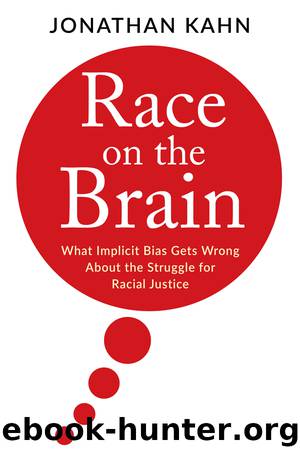Race on the Brain by Jonathan Kahn

Author:Jonathan Kahn
Language: eng
Format: epub
Publisher: Columbia University Press
7
RECREATIONAL ANTIRACISM AND THE POWER OF POSITIVE NUDGING
The interventions proposed by behavioral realists may also be giving rise to what I characterize as “recreational antiracism.” It is a natural extension of the privatization of antiracism. Its preeminent form is perhaps the IAT itself, which millions of people have taken. As one article in the journal Monitor on Psychology in 2008 noted, “The Implicit Association Test (IAT) is one of those rare research tools that has transcended the lab to catch the attention of not just the social psychologists, who use it in increasing numbers, but also a large swath of the general public. In fact, the IAT has been written about in newspapers, featured on radio and television and garnered more than 5 million visits to its official Web site (https://implicit.harvard.edu) by people who want to take the test.”1
Anecdotally, it is clear that many people taking the IAT do so on a whim or perhaps as part of a particular course they are taking (it is very popular on college campuses as well as in diversity-training programs). As the National Alliance for Partnership and Equity puts it, “Many participants find it fun or are curious as to the test results.”2 The test is literally a form of video game that takes the participant about five to ten minutes to complete. Ten minutes in front of a video screen, and you have taken the first step to addressing your own implicit biases—an easy, pain-free, technologically mediated, individualized means to feel connected to the enterprise of addressing racism.
This pain-free approach fits in with the general discomfort expressed by behavioral realists such as Mahzarin Banaji and Anthony Greenwald in calling Americans racist—they don’t want to make people feel uncomfortable about their attitudes. They want the process of self-discovery to be nonthreatening, inviting, and relatively painless. We see this approach in the very title of their book Blind Spot: Hidden Biases of Good People, which tells readers that they do not need to feel bad about having hidden biases because they are still “good people.” The title is also universalizing—we all are “good” people, and we all have these biases. Banaji and Greenwald move further toward make their findings palatable and nonthreatening by emphasizing that they believe that the IAT and related measures of implicit bias “are not the types of negativity or hostility that are generally taken to be characteristic of ‘prejudice.’ … This is why we answer ‘no’ to the question ‘Does automatic White preference mean “prejudice”?’ ” With the IAT, they were working toward developing a technique that could provide a “kind of aha moment,” where there was a “palpable recognition of automatic feelings that go counter to reflective ones.”3 This soft sell allows one to feel comfortable with one’s biases. Once readers or test takers experience this “aha” moment, all they have to do is be willing to work on addressing their blind spots.
Moving beyond the IAT, one recent study conducted at Dartmouth used something called “embedded game design” to
Download
This site does not store any files on its server. We only index and link to content provided by other sites. Please contact the content providers to delete copyright contents if any and email us, we'll remove relevant links or contents immediately.
| Anthropology | Archaeology |
| Philosophy | Politics & Government |
| Social Sciences | Sociology |
| Women's Studies |
Nudge - Improving Decisions about Health, Wealth, and Happiness by Thaler Sunstein(7711)
The Fire Next Time by James Baldwin(5452)
iGen by Jean M. Twenge(5418)
Adulting by Kelly Williams Brown(4579)
The Sports Rules Book by Human Kinetics(4393)
The Hacking of the American Mind by Robert H. Lustig(4386)
The Ethical Slut by Janet W. Hardy(4261)
Captivate by Vanessa Van Edwards(3842)
Mummy Knew by Lisa James(3694)
In a Sunburned Country by Bill Bryson(3544)
The Worm at the Core by Sheldon Solomon(3489)
Ants Among Elephants by Sujatha Gidla(3468)
The 48 laws of power by Robert Greene & Joost Elffers(3294)
Suicide: A Study in Sociology by Emile Durkheim(3024)
The Slow Fix: Solve Problems, Work Smarter, and Live Better In a World Addicted to Speed by Carl Honore(3012)
The Tipping Point by Malcolm Gladwell(2929)
Humans of New York by Brandon Stanton(2873)
Get What's Yours for Medicare: Maximize Your Coverage, Minimize Your Costs by Philip Moeller(2754)
Handbook of Forensic Sociology and Psychology by Stephen J. Morewitz & Mark L. Goldstein(2705)
